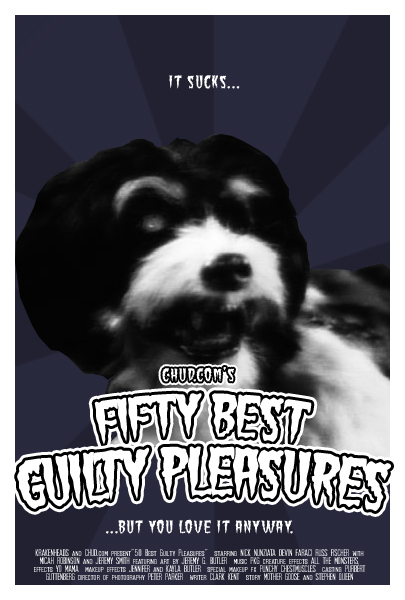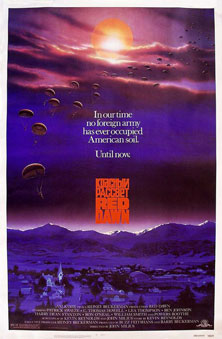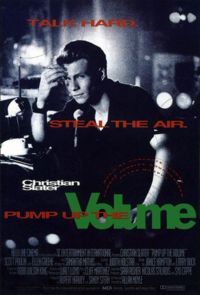
Welcome to the next CHUD List.
We’ve
tackled our our disappointments, our essentials list and slowly exhumed
our Kills List from 2003, and now that we’ve begun the beguine, we must
continue. Behold:
The CHUD.com Top 50 Guilty Pleasures.
We’ve
all got those little flicks that we know are wrong, but feel so right.
And after our preceding list of disappointment, we decided to cleanse
the palate by honoring our favorite guilty pleasures. These are films
that are flawed and often completely indefensible, but we can’t help but
love them anyway. As before, from a master list of over 100, the
involved parties (Devin, Jeremy, Micah, Russ, and Nick) all killed
off a choice for each one we claimed. As a result, we’ll run a big list
at the end of this of the ‘ones that got away’. So, here are the Top 50
Guilty Pleasures. Two a day, every week day for five weeks. In no
particular order:
#8
 Red Dawn (1984, Dir. John Milius)
Red Dawn (1984, Dir. John Milius)
Why
It’s a Guilty Pleasure: As a dyed in the wool leftist agitator, John Milius’ jingoistic, crypto-racist, borderline fascistic glorification of primal, backwards machismo and violence should be anathema to me. But I can’t help but love Red Dawn as an example of utterly bugfuck auterism, one part paranoid raving, one part admirable position taking. Sure, the idea of the Soviet Union invading the United States with the help of dirty Mexicans and Cubans was far-fetched even in 1984 (Morning in America, motherfuckers. Ronnie in the house!), but Milius’ take on guerilla war comes from a do or die American individualism that we haven’t seen since the end of WWII. The movie may be The Brat Pack vs The Red Army, but this is no teen adventure movie; it’s a real, gritty war film with plenty of casualties and atrocities on both sides. By 1984 nobody in America wanted to talk about sacrifice “hell, that’s part of what lost Jimmy Carter the presidency! ” but Milius bucked the popular post-Vietnam position and presented an old time values show filled with heroic young men and women taking bullets until all but two of them were dead. You’d think that this cast ofphotogenic cover kids would be able to end WWIII, but they barely even put a dent into the occupation of their one small town – now that’s un-Hollywood and against the GOP-fueled boosterism of the day. That Patrick Swayze should have resurrected Lenin just to kick him in his pinko teeth at the end.
Red Dawn becomes doubly fascinating when viewed today, since Milius based many of the teen guerilla’s techniques on the Mujahedeen fighting the Soviets in Afghanistan. You’ll recognize many of those tactics still being used in Iraq and Afghanistan today, except against us – all Red Dawn is missing is a bunch of IEDs. One man’s freedom fighter is another man’s terrorist, indeed.
War is hell, Milius concedes, but you get the impression he’s okay with it. It’s giving these kids – and America – character. You almost feel like Milius believes what this country needs is a good invasion to wake us up and clear out the sissies. The Wolverines may not be Spartans – there are some girls in their gang, after all (how progressive, Milius!) – but they’re certainly points on the same continuum of soldiers willing to give up their lives and the lives of anyone around them.
Signature Moment: ‘WOOOOOLVERINES!’ or maybe ‘AVENGE ME! AVEEEEENGE MEEEEE!’ But certainly something shouted.
What It’s Missing: A good cast. Milius is stuck with the glamour kids, not the real actors who soldiered it up a couple of years ago in Taps. Sure, it’s hilarious to see Jennifer Grey boobytrapping her own corpse, but I don’t think we’re supposed to be sniggering at such a potentially powerful moment. As a result, Milius’ dead serious war movie becomes surreally silly at points.
Also, Red Dawn is missing a distinctive score and instead just has some generic sounding “patriot” music.
My Personal Connection To It: I saw this sucker in a movie theater the first weekend it opened in 1984.”Wooooolverines!” became our battle cry in various games of war and manhunt at Flushing Meadow and Forest Parks. But after the grim ending I don’t think it’s a mystery why none of my friends ended up joining the military.
Watch It With: A green beret, an insurgent and a whole lotta ammo.
– Devin Faraci
#7
Pump Up the Volume (1990, Dir. Allan Moyle) Why It’s a Guilty Pleasure: Have you watched Pump Up the Volume lately? I don’t know if it was the country finally shaking off its two-term Reagan bender or the nascent grunge movement, but the early 90s were (don’t say “chockablock!”, don’t say “chockablock!”) chockablock (fuck!) with earnest cinematic appeals to youthful idealism. Boyz ‘N the Hood, The Commitments, Predator 2… okay, maybe it wasn’t so much a trend as it was me being sixteen or seventeen when those movies were released. But there was something that rang particularly true with Pump Up the Volume, which, when you think about it, is nothing more than Rock ‘n’ Roll High School played painfully straight (sans Eaglebauer).
Why It’s a Guilty Pleasure: Have you watched Pump Up the Volume lately? I don’t know if it was the country finally shaking off its two-term Reagan bender or the nascent grunge movement, but the early 90s were (don’t say “chockablock!”, don’t say “chockablock!”) chockablock (fuck!) with earnest cinematic appeals to youthful idealism. Boyz ‘N the Hood, The Commitments, Predator 2… okay, maybe it wasn’t so much a trend as it was me being sixteen or seventeen when those movies were released. But there was something that rang particularly true with Pump Up the Volume, which, when you think about it, is nothing more than Rock ‘n’ Roll High School played painfully straight (sans Eaglebauer).
When you’re seventeen and feeling vaguely oppressed by a system to which your chief contributions are a pile of scantron tests and essays elucidating the significance of Gatsby reaching for that goddamn green light (and learning “He’s a big homo” is not an acceptable reading), Pump Up the Volume offers an invigorating, vicarious crisis: what if you were broadcasting your adolescent discontent via shortwave radio, thereby pissing off the man (i.e. your principal), while turning on the hottest nerd chick in your school (i.e. Smantha Mathis)? And what if your searing diatribes of received indignation lifted from the writings and rantings of eternally hip malcontents like Lenny Bruce turned the entire student body against the institution? And what if your parents were completely oblivious to your shenanigans even though they provided you the equipment?
Pump Up the Volume is great fantasy when a teenager, but a very guilty pleasure once you’ve bounced around the real world for a few years. Allan Moyle’s undoubtedly sincere screenplay, with its urgent “Talk Hard!” exhortations, starts sounding like the work of a naif rather than a forty-three-year-old man. It’s a plea from a nostalgic radical of the sixties for a return to creative dissent, and Christian Slater’s Hard Harry is Moyle’s hopeful vision of a bus-riding Abbie Hoffman. But it just doesn’t play after a certain age.
Signature Moment: Samantha Mathis gets spontaneous, and topless, in response to a triumphant Hard Harry broadcast.
What It’s Missing: More “Signature Moments”.
My Personal Connection to It: I was just entering my junior year of high school when Pump Up the Volume hit theaters at the end of August 1990. As an aspiring agitator myself, I got off on the idea of using my words to galvanize my fellow classmates in organized revolt against… boredom. Mostly, though, I got off on Ms. Mathis.
Watch It With: The crushing sorrow of your misspent adulthood.
– Jeremy Smith